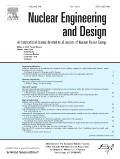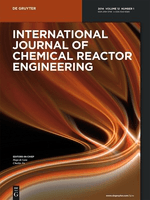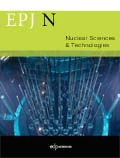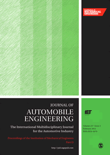
NUCLEAR ENGINEERING AND DESIGN
Scope & Guideline
Empowering Knowledge in Nuclear Energy and Safety
Introduction
Aims and Scopes
- Nuclear Reactor Design and Safety:
Research on the design principles and safety characteristics of various reactor types, including pressurized water reactors (PWR), boiling water reactors (BWR), and advanced concepts like small modular reactors (SMRs) and molten salt reactors. - Thermal-Hydraulics and Fluid Dynamics:
Studies focusing on the thermal-hydraulic behavior of reactor systems, including flow dynamics, heat transfer phenomena, and the impact of coolant characteristics on reactor performance. - Neutronics and Fuel Cycle Analysis:
Investigations into neutron behavior, fuel utilization, and cycle management, including studies on fuel performance, burnup analysis, and optimization of fuel loading patterns. - Severe Accident Analysis and Mitigation:
Research dedicated to understanding and mitigating the consequences of severe accidents in nuclear facilities, including modeling and simulation of accident scenarios and the performance of safety systems. - Advanced Materials and Corrosion Studies:
Exploration of new materials for reactor components, including corrosion resistance and mechanical performance under operational conditions, as well as innovative fuel designs. - Computational Methods and Simulation Techniques:
Development and application of advanced computational methods, including computational fluid dynamics (CFD), Monte Carlo simulations, and machine learning techniques for enhancing reactor design and safety assessments.
Trending and Emerging
- Small Modular Reactors (SMRs):
There is a growing emphasis on the design, safety, and operational aspects of small modular reactors, which are viewed as key to future nuclear energy strategies due to their flexibility and scalability. - Accident-Tolerant Fuels (ATFs):
Research into accident-tolerant fuels has gained momentum as the industry seeks to enhance the safety and performance of nuclear fuel under severe accident conditions. - Machine Learning and AI Applications:
The integration of machine learning and artificial intelligence into nuclear engineering is trending, particularly for predictive modeling, anomaly detection, and optimization of reactor operations. - Sustainability and Environmental Impact Studies:
There is an increased focus on the sustainability of nuclear energy through studies on waste management, recycling of actinides, and the long-term impacts of nuclear technologies on the environment. - Digital Twins and Real-time Monitoring:
The application of digital twin technology for real-time monitoring and predictive maintenance of nuclear facilities is emerging as a vital area of research, enhancing operational safety and efficiency.
Declining or Waning
- Traditional Reactor Types:
There has been a noticeable decrease in research specifically focused on traditional reactor types such as older PWR and BWR designs, as the field shifts towards newer technologies such as SMRs and advanced reactors. - Subcritical Reactors:
Research on subcritical reactors has diminished in recent years, possibly due to the increasing focus on fast reactors and molten salt reactors which are seen as more viable for future energy needs. - Conventional Fuel Cycles:
Interest in conventional uranium fuel cycles has waned as researchers increasingly turn towards alternative fuels, including thorium and advanced fuels that promise improved sustainability and safety. - Basic Thermal-Hydraulic Studies:
While thermal-hydraulic studies remain important, the focus has shifted from basic principles to more complex scenarios involving advanced reactor designs and safety systems, resulting in fewer publications on fundamental thermal-hydraulic concepts.
Similar Journals

International Journal of Chemical Reactor Engineering
Advancing the Frontiers of Chemical Reactor ScienceInternational Journal of Chemical Reactor Engineering, published by WALTER DE GRUYTER GMBH, serves as a vital platform for advancing knowledge in the field of chemical engineering, specifically focusing on reactor engineering. The journal, recognized by its ISSN 2194-5748 and E-ISSN 1542-6580, has maintained its commitment to quality research since its inception in 2002 and spans converged years through 2024. With a respectable Q3 ranking in the miscellaneous category of Chemical Engineering and a current Scopus rank of 158/273, it represents a significant resource for researchers aiming to publish innovative findings and practical applications. Although it operates under a subscription model, it still attracts attention for its rigorous standards and insightful contributions to the field. The journal’s focus on the interdisciplinary aspects of chemical reactor design, optimization, and safety underscores its importance in driving forward the technical and theoretical boundaries of chemical engineering. Addressed from Genthiner Strasse 13, D-10785 Berlin, Germany, the International Journal of Chemical Reactor Engineering is a must-read for professionals and scholars dedicated to pushing the frontiers of chemical reaction technologies.

ATW-INTERNATIONAL JOURNAL FOR NUCLEAR POWER
Catalyzing Progress in Nuclear Power TechnologyATW - International Journal for Nuclear Power is a premier journal dedicated to advancing the understanding and application of nuclear technology within the energy sector. Published by INFORUM Verlags-Verwaltungsgesellschaft mbH, this esteemed publication provides a platform for researchers, professionals, and students to disseminate cutting-edge research, practical applications, and critical analyses related to nuclear power generation. Although it has discontinued coverage in Scopus since 2012, its long-standing contributions to the field since 1996 underscore its significance and relevance. The journal aims to bridge the gap between theoretical insights and real-world applications, ensuring that stakeholders are well-informed on the latest trends, safety protocols, and innovations in nuclear power. With a commitment to fostering knowledge dissemination and collaboration, ATW continues to be an essential resource for anyone involved in the nuclear energy landscape.

International Journal of Heavy Vehicle Systems
Exploring the Future of Automotive EngineeringThe International Journal of Heavy Vehicle Systems, published by INDERSCIENCE ENTERPRISES LTD in the United Kingdom, is a pivotal resource for professionals and researchers in the fields of automotive and mechanical engineering. With an ISSN of 1744-232X and an E-ISSN of 1741-5152, this journal serves as an academic platform dedicated to exploring the latest innovations and technologies pertaining to heavy vehicle systems, including design, performance, and environmental impact. Boasting a Category Quartile of Q3 in both Automotive and Mechanical Engineering as of 2023, it ranks among the growing body of literature in these disciplines, indicative of its commitment to quality research. The journal is widely accessible through diverse open access options, encouraging the dissemination of knowledge within the academic community. By publishing cutting-edge studies and reviews, the International Journal of Heavy Vehicle Systems plays an essential role in advancing our understanding of heavy vehicle technologies, providing invaluable insight for engineers, researchers, and students eager to contribute to this dynamic field.

Ingineria Automobilului
Driving Innovation in Automotive EngineeringIngineria Automobilului is a prominent journal dedicated to advancing knowledge in the field of automotive engineering. Published by the SOC AUTOMOTIVE ENGINEERS ROMANIA, this journal serves as a vital platform for the dissemination of high-quality research, innovative methodologies, and groundbreaking applications in automotive technology. With an ISSN of 1842-4074, it provides an essential resource for researchers, professionals, and students who are committed to the development and enhancement of automotive systems. Although the journal currently does not offer open access, its contributions are crucial for ongoing advancements in automotive design, safety, and sustainability. The publication aims to foster collaboration between academia and industry, emphasizing the importance of interdisciplinary approaches in solving complex challenges facing the automotive sector today. By facilitating discussions on emerging technologies and engineering practices, Ingineria Automobilului continues to play a pivotal role in shaping the future of automotive engineering.

Brodogradnja
Fostering Global Collaboration in Marine Engineering ResearchBrodogradnja is a distinguished open-access journal dedicated to the fields of Mechanical Engineering and Naval Architecture, published by the University of Zagreb's Faculty of Mechanical Engineering & Naval Architecture. Since its launch, the journal has been at the forefront of disseminating valuable research and advancements in engineering design, marine technology, and shipbuilding practices, contributing significantly to both academic literature and industrial applications. With an impressive Q1 ranking in Mechanical Engineering and a Q2 ranking in Ocean Engineering for 2023, it stands as a pivotal resource for researchers, professionals, and students alike. Moreover, the journal's commitment to open access since 2005 ensures that cutting-edge research is accessible to a global audience, facilitating collaboration and knowledge-sharing among experts in the field. Based in Croatia, Brodogradnja continues to uphold the legacy of high-quality technical scholarship and innovation, making it an essential platform for advancing marine engineering and related disciplines.

SAE International Journal of Passenger Vehicle Systems
Advancing Knowledge in Automotive TechnologyWelcome to the SAE International Journal of Passenger Vehicle Systems, a premier publication in the realm of automotive engineering. Published by SAE International, this journal serves as a critical platform for disseminating high-caliber research focused on the innovation and advancement of passenger vehicle systems. With an impact factor that reflects its growing influence, this open-access journal enhances visibility and accessibility, supporting a diverse readership that includes researchers, engineers, and automotive professionals. Covering a broad scope that incorporates safety, reliability, and mechanical engineering among others, the journal is categorized in the Q3 and Q4 quartiles for various engineering fields, indicating its significance and the potential for impactful contributions to ongoing discussions within the automotive sector. The Scopus rankings further underscore its commitment to quality, placing it within the mid-range of prominent publications. As a valued resource, the SAE International Journal of Passenger Vehicle Systems from 2022 to 2024 offers a vital forum for knowledge exchange, aimed at inspiring breakthroughs in automotive technology and enhancing passenger safety.

Mechanical Engineering Journal
Unlocking insights that drive engineering breakthroughs.The Mechanical Engineering Journal, published by the Japan Society of Mechanical Engineers, serves as a premier platform for scholarly discourse in the field of mechanical engineering. With an ISSN of 2187-9745 and embracing an Open Access model since 2014, this journal fosters wide dissemination of research findings, ensuring that valuable insights are accessible to a global audience. The journal aims to bridge the gap between theoretical advancements and practical applications in mechanical engineering, making it a vital resource for researchers, industry professionals, and students alike. Located in the heart of Tokyo, Japan, this publication upholds the highest standards of academic integrity and innovation, contributing significantly to advancements in mechanical engineering and related disciplines. Stay abreast of powerful research that pushes the boundaries of technology and engineering applications by exploring the latest issues of this influential journal.

EPJ Nuclear Sciences & Technologies
Unleashing Potential in Nuclear and High Energy PhysicsEPJ Nuclear Sciences & Technologies is a prominent Open Access journal published by EDP Sciences S A, focusing on the vital fields of Nuclear and High Energy Physics, Nuclear Energy and Engineering, and Energy Engineering and Power Technology. Launched in 2015, this journal provides a platform for researchers, students, and professionals to disseminate cutting-edge research and innovations that address the challenges and opportunities in nuclear sciences, a field of critical importance in today’s energy landscape. With an ISSN of 2491-9292 and an evolving impact reflected in its 2023 Q3 quartile rankings across several relevant categories, EPJ Nuclear Sciences & Technologies is committed to promoting high-quality, peer-reviewed research accessible to a global audience. Its dedicated focus on enhancing knowledge transfer and international collaboration makes it an essential resource for anyone engaged in nuclear sciences and technologies.

PROCEEDINGS OF THE INSTITUTION OF MECHANICAL ENGINEERS PART D-JOURNAL OF AUTOMOBILE ENGINEERING
Transforming Ideas into Automotive InnovationsPROCEEDINGS OF THE INSTITUTION OF MECHANICAL ENGINEERS PART D-JOURNAL OF AUTOMOBILE ENGINEERING, published by SAGE PUBLICATIONS LTD, is a premier peer-reviewed journal dedicated to advancing the field of automobile engineering. Established in 1989, this journal serves as a vital platform for researchers, professionals, and students interested in the latest advancements in automotive technology and engineering practices. With a significant focus on aerodynamics, vehicle dynamics, and safety innovations, it consistently ranks in the Q2 quartile within both Aerospace Engineering and Mechanical Engineering, showcasing its influence and reliability in the academic community. The journal is indexed in Scopus with impressive rankings, being placed in the 41st percentile for Aerospace Engineering and the 214th percentile for Mechanical Engineering, further solidifying its importance in these fields. As an important resource for cutting-edge research, the journal does not currently offer open access, making it a great venue for disseminating substantial findings that drive the future of automotive innovation.

Problems of Atomic Science and Technology
Unveiling the Future of Nuclear Engineering.Problems of Atomic Science and Technology is a leading journal in the realm of nuclear physics and technology, published by the esteemed Kharkov Institute of Physics and Technology. With an ISSN of 1562-6016, this journal is dedicated to disseminating high-quality research and advancements in atomic sciences, contributing significantly to both academic and practical applications in the field. Although not an open access publication, it ensures rigorous peer review standards to maintain the integrity and relevance of cited works. The journal seeks to provide a vital platform for researchers, professionals, and students who are engaged in the exploration of atomic phenomena, nuclear engineering, and associated technologies. Published from Kharkov, Ukraine, the journal also serves as a bridge for international collaboration and innovation, making it indispensable for anyone looking to stay at the forefront of atomic science research.